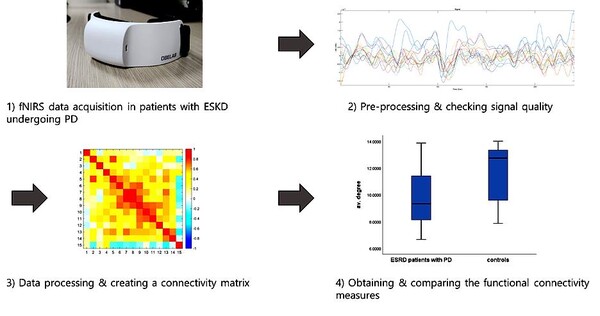A study has found that end-stage renal disease patients undergoing peritoneal dialysis show reduced brain functional connectivity compared with healthy individuals, placing them at greater risk of cognitive decline.
Inje University Haeundae Paik Hospital announced Monday that a research team led by Professor Heo Chang-min of the Department of Nephrology discovered significantly lower brain functional connectivity in patients on long-term peritoneal dialysis.

Neurological complications such as memory impairment and dementia frequently occur in end-stage renal disease due to anemia, accumulation of toxins, and vascular damage. Yet the precise mechanisms remain unclear, and studies directly examining brain changes in peritoneal dialysis patients are rare worldwide.
The team compared 20 patients who had been on peritoneal dialysis for more than six months with 20 healthy adults of the same age.
Brain activity was measured using functional near-infrared spectroscopy (fNIRS), a method in which sensors worn on the head detect changes in blood flow and oxygen levels using light. Unlike MRI, fNIRS does not require entering a scanner and can be performed conveniently in outpatient clinics.
Analysis showed that peritoneal dialysis patients had lower brain connectivity, connection strength, and network efficiency than the control group. This suggests a reduced ability of brain regions to cooperate and exchange information. Moreover, brain connectivity correlated closely with several clinical indicators, including dialysis adequacy (Kt/V), blood phosphorus, and hemoglobin levels.
“Reduced brain connectivity leads to impaired memory and concentration,” the researchers said. “Cognitive decline in dialysis patients is not solely age-related; dialysis status and changes in blood composition can directly affect brain signaling networks.”
Professor Heo emphasized that the treatment goal for dialysis patients should extend beyond prolonging survival to preserving quality of life and cognitive function. “We plan to conduct long-term follow-up studies in larger patient populations to help develop strategies for dementia prevention and treatment,” he said.
The findings were published in the latest issue of PLOS ONE under the title “Analysis of functional brain connectivity in patients with end-stage kidney disease undergoing peritoneal dialysis using functional near-infrared spectroscopy.”
Related articles
- 80% of kidney patients call for home peritoneal dialysis to become national program: survey
- Nephrology society aims to cut chronic kidney disease by 10% by 2033
- Vantive Korea pushes to boost home peritoneal dialysis use
- Post-Baxter, Vantive targets Korea’s kidney crisis with digital home strategy, eyes liver and lung care next
- Korea faces decline in peritoneal dialysis adoption despite growing global trend

